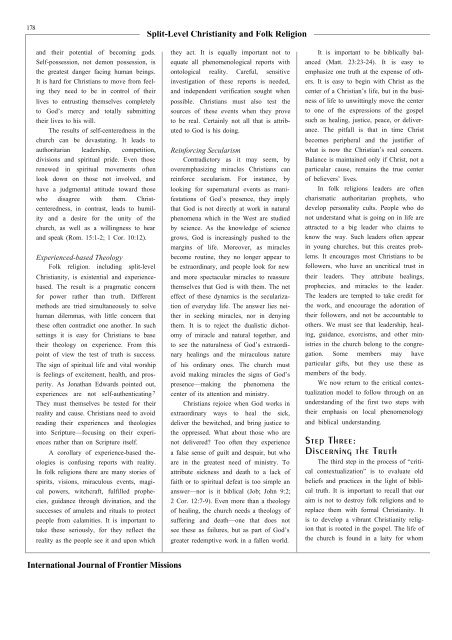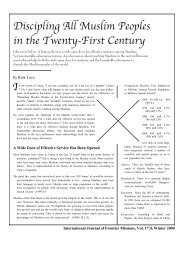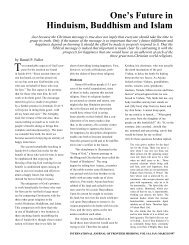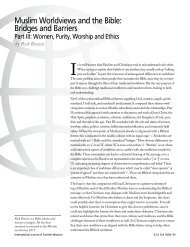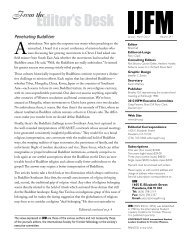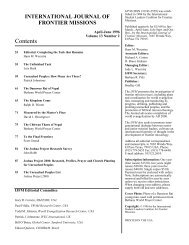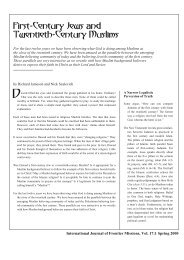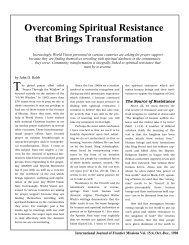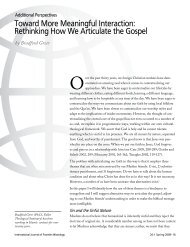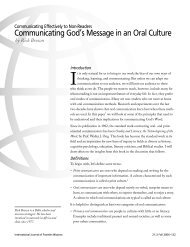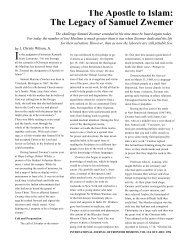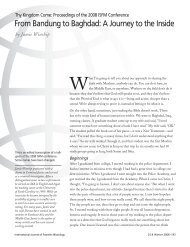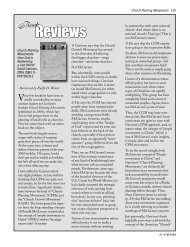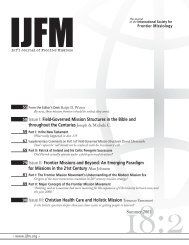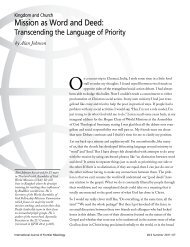Responding to Split-Level Christianity and Folk Religion
Responding to Split-Level Christianity and Folk Religion
Responding to Split-Level Christianity and Folk Religion
Create successful ePaper yourself
Turn your PDF publications into a flip-book with our unique Google optimized e-Paper software.
178<strong>Split</strong>-<strong>Level</strong> <strong>Christianity</strong> <strong>and</strong> <strong>Folk</strong> <strong>Religion</strong><strong>and</strong> their potential of becoming gods.Self-possession, not demon possession, isthe greatest danger facing human beings.It is hard for Christians <strong>to</strong> move from feelingthey need <strong>to</strong> be in control of theirlives <strong>to</strong> entrusting themselves completely<strong>to</strong> God’s mercy <strong>and</strong> <strong>to</strong>tally submittingtheir lives <strong>to</strong> his will.The results of self-centeredness in thechurch can be devastating. It leads <strong>to</strong>authoritarian leadership, competition,divisions <strong>and</strong> spiritual pride. Even thoserenewed in spiritual movements oftenlook down on those not involved, <strong>and</strong>have a judgmental attitude <strong>to</strong>ward thosewho disagree with them. Christcenteredness,in contrast, leads <strong>to</strong> humility<strong>and</strong> a desire for the unity of thechurch, as well as a willingness <strong>to</strong> hear<strong>and</strong> speak (Rom. 15:1-2; 1 Cor. 10:12).Experienced-based Theology<strong>Folk</strong> religion. including split-level<strong>Christianity</strong>, is existential <strong>and</strong> experiencebased.The result is a pragmatic concernfor power rather than truth. Differentmethods are tried simultaneously <strong>to</strong> solvehuman dilemmas, with little concern thatthese often contradict one another. In suchsettings it is easy for Christians <strong>to</strong> basetheir theology on experience. From thispoint of view the test of truth is success.The sign of spiritual life <strong>and</strong> vital worshipis feelings of excitement, health, <strong>and</strong> prosperity.As Jonathan Edwards pointed out,experiences are not self-authenticating .7They must themselves be tested for theirreality <strong>and</strong> cause. Christians need <strong>to</strong> avoidreading their experiences <strong>and</strong> theologiesin<strong>to</strong> Scripture—focusing on their experiencesrather than on Scripture itself.A corollary of experience-based theologiesis confusing reports with reality.In folk religions there are many s<strong>to</strong>ries ofspirits, visions, miraculous events, magicalpowers, witchcraft, fulfilled prophecies,guidance through divination, <strong>and</strong> thesuccesses of amulets <strong>and</strong> rituals <strong>to</strong> protectpeople from calamities. It is important <strong>to</strong>take these seriously, for they reflect thereality as the people see it <strong>and</strong> upon whichthey act. It is equally important not <strong>to</strong>equate all phenomenological reports withon<strong>to</strong>logical reality. Careful, sensitiveinvestigation of these reports is needed,<strong>and</strong> independent verification sought whenpossible. Christians must also test thesources of these events when they prove<strong>to</strong> be real. Certainly not all that is attributed<strong>to</strong> God is his doing.Reinforcing SecularismContradic<strong>to</strong>ry as it may seem, byoveremphasizing miracles Christians canreinforce secularism. For instance, bylooking for supernatural events as manifestationsof God’s presence, they implythat God is not directly at work in naturalphenomena which in the West are studiedby science. As the knowledge of sciencegrows, God is increasingly pushed <strong>to</strong> themargins of life. Moreover, as miraclesbecome routine, they no longer appear <strong>to</strong>be extraordinary, <strong>and</strong> people look for new<strong>and</strong> more spectacular miracles <strong>to</strong> reassurethemselves that God is with them. The neteffect of these dynamics is the secularizationof everyday life. The answer lies neitherin seeking miracles, nor in denyingthem. It is <strong>to</strong> reject the dualistic dicho<strong>to</strong>myof miracle <strong>and</strong> natural <strong>to</strong>gether, <strong>and</strong><strong>to</strong> see the naturalness of God’s extraordinaryhealings <strong>and</strong> the miraculous natureof his ordinary ones. The church mustavoid making miracles the signs of God’spresence—making the phenomena thecenter of its attention <strong>and</strong> ministry.Christians rejoice when God works inextraordinary ways <strong>to</strong> heal the sick,deliver the bewitched, <strong>and</strong> bring justice <strong>to</strong>the oppressed. What about those who arenot delivered? Too often they experiencea false sense of guilt <strong>and</strong> despair, but whoare in the greatest need of ministry. Toattribute sickness <strong>and</strong> death <strong>to</strong> a lack offaith or <strong>to</strong> spiritual defeat is <strong>to</strong>o simple ananswer—nor is it biblical (Job; John 9:2;2 Cor. 12:7-9). Even more than a theologyof healing, the church needs a theology ofsuffering <strong>and</strong> death—one that does notsee these as failures, but as part of God’sgreater redemptive work in a fallen world.It is important <strong>to</strong> be biblically balanced(Matt. 23:23-24). It is easy <strong>to</strong>emphasize one truth at the expense of others.It is easy <strong>to</strong> begin with Christ as thecenter of a Christian’s life, but in the businessof life <strong>to</strong> unwittingly move the center<strong>to</strong> one of the expressions of the gospelsuch as healing, justice, peace, or deliverance.The pitfall is that in time Christbecomes peripheral <strong>and</strong> the justifier ofwhat is now the Christian’s real concern.Balance is maintained only if Christ, not aparticular cause, remains the true centerof believers’ lives.In folk religions leaders are oftencharismatic authoritarian prophets, whodevelop personality cults. People who donot underst<strong>and</strong> what is going on in life areattracted <strong>to</strong> a big leader who claims <strong>to</strong>know the way. Such leaders often appearin young churches, but this creates problems.It encourages most Christians <strong>to</strong> befollowers, who have an uncritical trust intheir leaders. They attribute healings,prophecies, <strong>and</strong> miracles <strong>to</strong> the leader.The leaders are tempted <strong>to</strong> take credit forthe work, <strong>and</strong> encourage the adoration oftheir followers, <strong>and</strong> not be accountable <strong>to</strong>others. We must see that leadership, healing,guidance, exorcisms, <strong>and</strong> other ministriesin the church belong <strong>to</strong> the congregation.Some members may haveparticular gifts, but they use these asmembers of the body.We now return <strong>to</strong> the critical contextualizationmodel <strong>to</strong> follow through on anunderst<strong>and</strong>ing of the first two steps withtheir emphasis on local phenomenology<strong>and</strong> biblical underst<strong>and</strong>ing.Step Three:Discerning the TruthThe third step in the process of “criticalcontextualization” is <strong>to</strong> evaluate oldbeliefs <strong>and</strong> practices in the light of biblicaltruth. It is important <strong>to</strong> recall that ouraim is not <strong>to</strong> destroy folk religions <strong>and</strong> <strong>to</strong>replace them with formal <strong>Christianity</strong>. Itis <strong>to</strong> develop a vibrant <strong>Christianity</strong> religionthat is rooted in the gospel. The life ofthe church is found in a laity for whomInternational Journal of Frontier Missions


